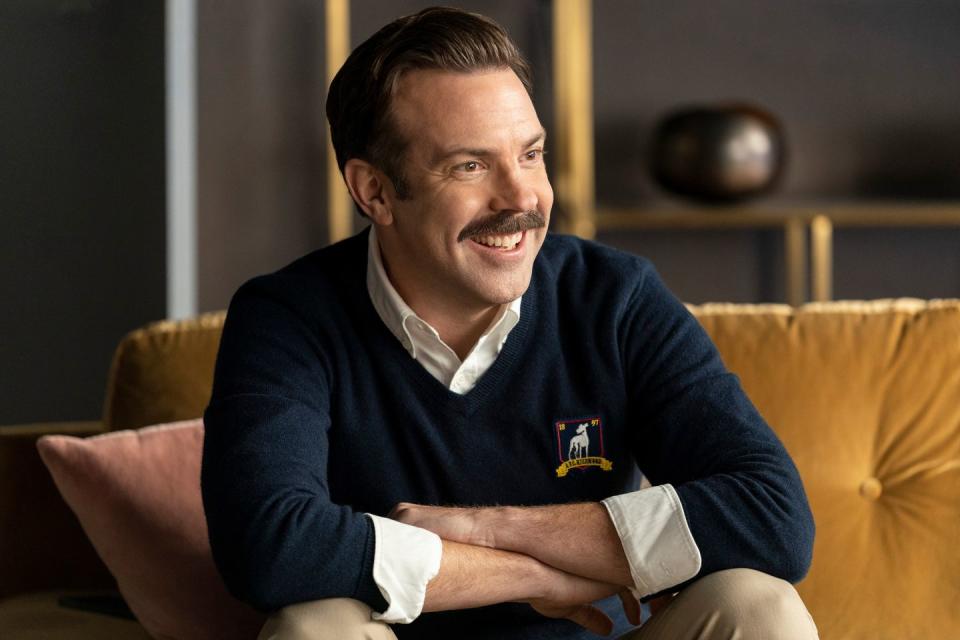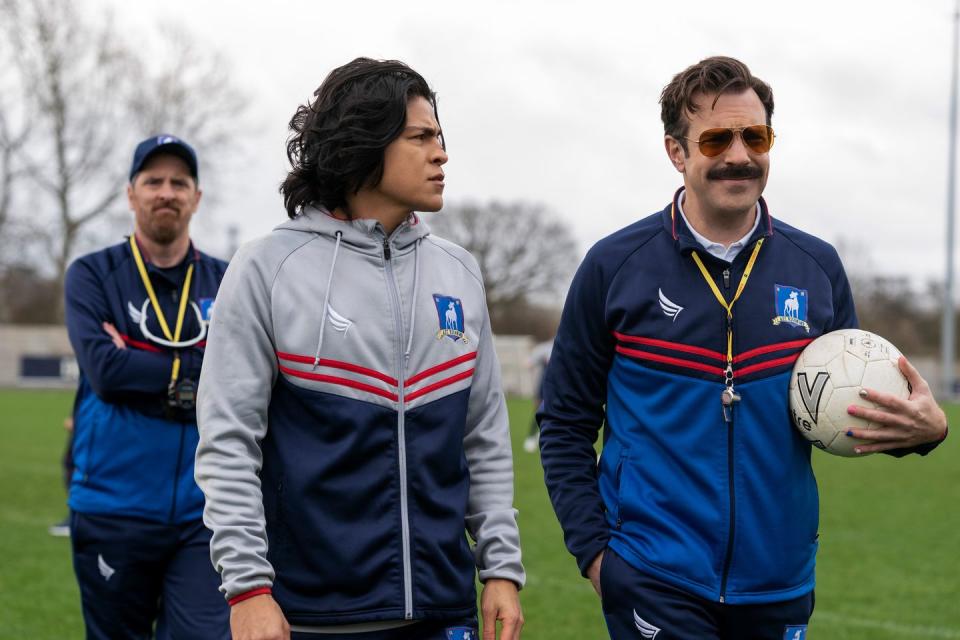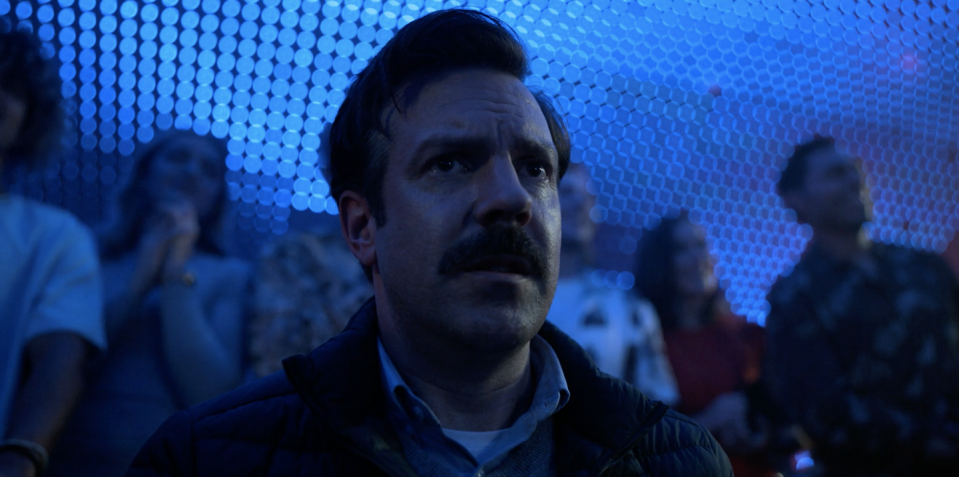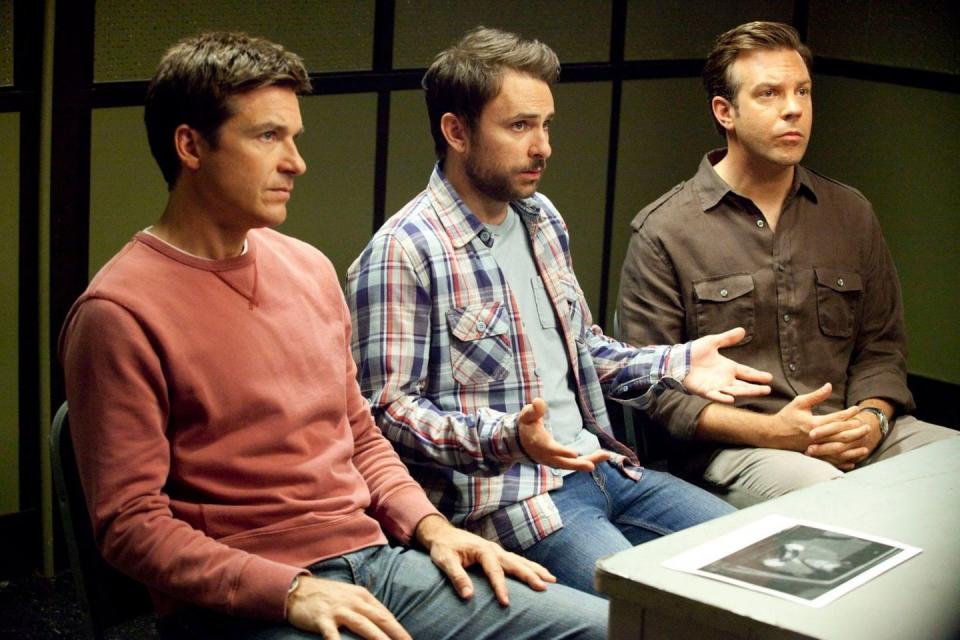Seeing the World Through Ted Lasso's Eyes With Jason Sudeikis
- Oops!Something went wrong.Please try again later.
- Oops!Something went wrong.Please try again later.
The first episode of Season 2 of Ted Lasso—easily the most good-intentioned, feel-good, hilarious show to come out since the Covid-19 era began—kicks off with a New York Jets joke. "Back home if a team is playing poorly, we don't call them unlucky. What do we call them coach?" Ted asks his assistant, Coach Beard, within the show's first 10 minutes. "The New York Jets," Beard replies.
When you're a fan of the Jets, as I am, you tend to be the butt of a lot of jokes. But you don't always have the chance to take the joker to task when they're the show's co-creator, star, writer, producer, and probably filling several other uncredited roles for good measure. When I had the chance to chat with Jason Sudeikis on Zoom, he was characteristically good natured. "Yep," he says with a smile, just as I flash him a quick glimpse of the New York Jets hat I decided to wear just for the occasion. "I’m sorry, and... you’re welcome?"
And, honestly, that's the kind of vibe that Ted Lasso—based on a series of commercials for NBC Sports Network that first aired in 2013—has given off from its very first moment. It's just such a warm show that even a punch at a place that's been hit many times before feels playful. As both writer and deliverer of the Jets-dunk, Sudeikis takes full responsibility.

Then again, he's responsible for a whole lot of what makes the show—which earlier this month earned an astounding 20 Emmy nominations, including three for Sudeikis himself—work. With all that success and adoration, surely pressure must come too. But, like his radically kind character, he looks at things humbly. And what could be the most important thing to a Golden Globe-winner who just got nominated for a bunch of Emmys before the camera starts rolling?
"Know my lines!" Sudeikis says, laughing. "That’s it. Ted gives a lot of speeches, man, so it’s like...knowing the lines, knowing the blocking, and I was just holding a lot in my head and heart these days."

But he's not saying that from a selfish standpoint. As he explains, he wants get those lines right because forgetting his lines would make the workday last longer, not just for him, but for the show's entire cast and crew. And as a co-creator, he needs to make sure everyone's on board with how things are playing out. "I have to make sure everybody else is feeling good about what they’re doing," he says. "Otherwise, I won’t be able to concentrate on feeling good myself."
It's not hard to imagine the former Saturday Night Live alum in full Ted mode, coaching everyone on the Ted Lasso set up. But he's not Ted—he's Jason. And what he's got here is just a great show, one seemingly universally adored; in a time when the world has been, well, not such a great place, it's entertainment that puts a smile on people's faces. And that's what we've all really needed, and clearly what people have embraced.
Sudeikis talked with Men's Health about Season 2 of Ted Lasso, how he approaches making the show, and what to keep an eye out for in the near future.

I know you’re a big sports fan. How did that lead into wanting to make this sports show?
Being a sports fan is almost secondary to being a fan of films about sports. I think sports are great metaphors for family, for ensemble. When you have different people with perhaps different goals, sometimes they’re in opposition, sometimes they’re in harmony, and trying to get a group of people all facing the same direction, and rowing at the same time, in the same way, is challenging. And in those challenges there’s a lot of opportunity for comedy and drama. And so it’s as much rooted in being raised by sports films as it is by actually playing sports, or even watching them now as a grown-up.
That’s it. It’s all metaphors for parenting, and mentoring, and fathers and sons, and all that fun stuff that we all deal with and go through.
I’m glad you mentioned the whole sports movies/TV genre. Ted, as a character, seems unique in his relentless positivity, as opposed to some of the more toxic coach type characters within this world. How did you get here?
It was really within itself. The first commercial, our goal there was to do the gig. You know, we were hired to make this commercial with several other people. We just wanted to go to a free soccer game! We just wanted to be flown back out—that was our goal.
But then the commercial really hit, and people really dug it. Both people in the U.S., people in the U.K., soccer fans, football fans, comedy folks. It was almost this Olympic Rings type venn diagram that we were aiming for, but by no means did we think we’d achieve. So we got to do a second one. And in doing that second one, it really unlocked those elements of the television version of Ted, which was enthusiasm and optimism, and taking this character and finding Oh, this is such a fun way to view the world. And Brendan [Hunt] and I, as a double act, could just really play off each other really well, and then me improvising as Ted...it just found a place in my brain that I could write, and come up with silly lines, and a silly point of view. But then also a very thoughtful point of view, as we spend more and more time marinating on the idea of the character, and turning it into this longer format.

One of my favorite parts of Season 1 was when Ted was at the karaoke bar, and has a panic attack, and he goes outside and Rebecca helps him out. The idea that somebody as positive, and seemingly in such a good space as Ted can have his own troubles, I think is really interesting. In Season 2, you introduce a new sports psychologist character, and it builds on everyone having their own ups and downs a bit more. How important is it for you to get that aspect of things into the show?
Hugely important. It was in the original idea for the show. It was something that, even down to knowing it was going to happen after a win, and it was going to happen in Episode 7. You know, I just wanted to capture that experience as authentically as we could, given the elements of storytelling that we had at our disposal.
Because it’s something more people go through, probably, than they even realize. It’s something that the more we recognize in ourselves and in one another, I think the more space we give ourselves to let ourselves off the hook when those things happen. Or, at least, allow space to listen to those moments when the universe or our bodies and our minds and our souls are trying to tell us Hey, something’s going on here. You want to deal with it. I mean, our cars do it, you know? You know you’ve got to replace your brakes when they start squeaking. You can only turn the radio up for so long—at some point the brakes just will stop working. They’ll start screeching, and grinding, and that’s when you know you need to take it into the shop. And the human body is set up that same way.
The inclusion of Dr. Sharon Fieldstone in the second season was in the spirit of moving into a second act of a season of a story that we’re telling. Just an agitation, and more of an agitation than an antagonist for Ted. And that agitation, like any agitation, can blister, or can create a pearl. And it’s kind of like how one responds in the environment in which that agitation occurs. Yeah, she’s gonna definitely...she’s already provoked Ted in a way that...he doesn’t know what she’s doing. And you’re already starting to see Ted respond to her in a way that’s very un Ted-like. But the reason you know that is because you’ve spent 300+ minutes getting to know that guy, just like we’ve spent a lot of time with all these other characters that are going to go through a similar journey. Maybe not prompted by Sharon, but other internal and external forces for sure.
When you were making the first season, you didn’t know it was going to be coming out during a global pandemic. But I think the show coming out and being such a positive, feel-good viewing experience meant a lot to a lot of people. I’m curious if returning for Season 2 during Covid changed your approach—were you thinking about reading even extra positivity?
The last half of Season 1 was edited during the pandemic. I edited it on a laptop, but I’d never really edited a show that much, or been involved in post-production. So I was kind of learning on the fly—I was like Oh, this is how you do it!
But then, upon writing the second season, we did it over Zoom. And that’s a different experience than I’ve ever had. Writing comedy, creating comedy, breaking story, telling stories—and yet, I can tell you man, those few hours we’d be on Zoom, with some really kind, smart, funny, talented people, was therapeutic. Playing FIFA with other producers, and all the dudes from the team, as AFC Richmond in the pro clubs section of FIFA online playing, was therapeutic. Getting to shoot the show, where we were allowed to hug if it was scripted. Where we were in a pub, even though it was make believe, was therapeutic.
So, that positivity of the show, while the outside was certainly dealing with it, and we were all certainly dealing with it when work wrapped that day, or the laptop closed that afternoon, those were moments of hope. Those were moments of knowing and believing we’re going to get onto the side. We had to ride the horse in the direction it was facing, as the old saying goes, and I think in a weird way, the show benefits from it. It’s not the way I would hope Season 3 goes, knock on wood, not just for us but for anyone. But I didn’t feel the negatives of it as much as someone that didn’t have that opportunity.

We’ve talked about the positivity of Ted Lasso, both the character and the show itself. But that mood is a pretty stark change from some other things you’ve done, including another of my favorites, Horrible Bosses, which is a pretty clear dark comedy.
Sure, sure.
When you’re comparing those experiences, do you prefer one to the other? Is one a different mood?
No, man! Working with Charlie and Jason is one of the most joyful experiences of my life, because I think they’re so talented. And it’s one of those things where, similar to the triangle of me, Joe, and Brendan on the production side of this show, it’s like, when one of us is making the other two laugh, you know you’re doing something at a fun level, just like hanging out with friends.
But no, it’s all about knowing what the story is about, and the themes are. I’m just always interested in that, and curious in that. Because it helps root things in something more real than just the make believe of make believe. I don’t mean it to sound artsy fartsy or hoity toity, or act like getting to do movies and television is a bigger deal than it is on a spiritual level, but if you put some thought into it, I think you get back more. So, Horrible Bosses is as fun of a time as I’ve ever had, and maybe some day when we’re grandparents we’ll do Horrible Bosses 3, grumpy old man style.
I’d love it. I’m glad you mentioned Charlie there—you sort of crossed into his world in a couple Always Sunny episodes. I’m a big SNL loyalist too, so you’ve got a lot of friends from those days. Have you wanted to bring anybody from any of your past worlds into Ted Lasso as maybe a rival coach, or something like that?
I mean, that’s not a bad idea. I’ve been lucky to have a lot of talented people that I have access to in my cell phone currently. Yeah, there’s always a possibility there. Like Andrea Anders, who plays Ted’s wife, is an amazing actress who I met when I did a chemistry read with her back in 2009 for the movie Hall Pass. Christina Applegate ended up playing my wife in that movie, and luckily, because she was incredible. But early in those days, before Christina was involved, I did an audition with several women, and I just thought she was fantastic. So when it came time to reach out to someone—and we hadn’t talked in over 10 years, or whatever it was—she came to mind.
So, anybody that I’m fortunate enough to work with, much like the show itself, there’s always the opportunity—unless I’ve fucked it up—to work together again.
There is a fun little...it’s not a cameo by any means, because he’s in the story, but it’s someone that I have worked with in the past and think quite nearly and dearly towards. He shows up in later episodes, and I’m excited for people to see, because he’s a badass.
This interview has been edited for content and clarity.
You Might Also Like

